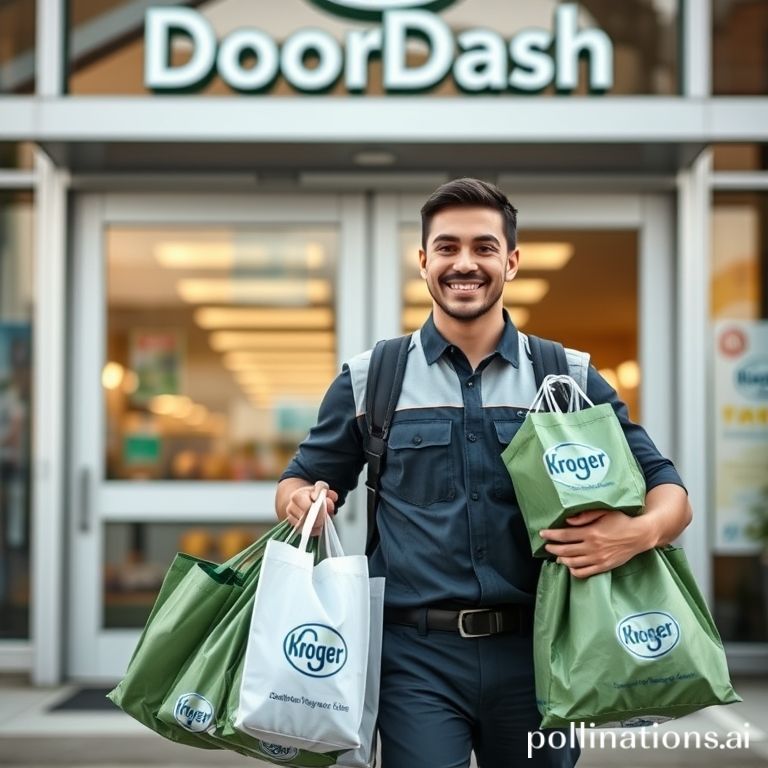DoorDash & Kroger Expand Partnership to 2,700 Stores

DoorDash and Kroger Forge Expansive Partnership for Grocery Delivery
The landscape of on-demand grocery delivery is undergoing significant transformation, exemplified by the recent expansion of the strategic alliance between DoorDash, a leading technology-driven logistics platform, and Kroger, one of America's largest grocery retailers. This augmented collaboration is set to integrate an additional 2,700 Kroger stores into DoorDash's extensive delivery network, commencing on October 1st. This development signifies a pivotal moment for both entities, aiming to enhance accessibility to fresh produce, everyday essentials, and Kroger's esteemed "Our Brands" private label products for millions of consumers nationwide.
DoorDash's official announcement highlighted the increasing consumer demand for convenient, on-demand delivery services that do not compromise on value or savings. Kroger has consistently ranked among the most sought-after and frequently requested grocers on the DoorDash platform, underscoring the intrinsic market need for this type of service. The alliance reinforces Kroger's position as the largest grocery partner within DoorDash's ecosystem, capitalizing on a demonstrable surge in grocery orders recorded during the second quarter of the current year, indicating a growing consumer preference for digital grocery procurement.
Strategic Imperatives Driving the Expansion
The decision to broaden this partnership is rooted in several strategic imperatives that address evolving consumer behaviors and market dynamics. Firstly, the convenience factor of on-demand delivery resonates deeply with contemporary lifestyles, offering a seamless solution for busy individuals and families to receive groceries directly at their doorstep. Secondly, the inclusion of Kroger's private label "Our Brands" offerings is a notable strategic advantage. These store-exclusive products, often positioned as cost-effective alternatives to national brands, have experienced a significant uptick in popularity across the grocery sector.
Industry experts, such as Shekar Raman, CEO and co-founder of Birdzi, attribute the ascent of private-label brands to a confluence of factors. Retailers, including Kroger, have proactively diversified and expanded their private-label portfolios beyond mere budget-friendly options to encompass premium, organic, and specialty segments. Simultaneously, prevailing economic pressures and inflationary trends have compelled consumers to meticulously seek out avenues for cost savings, thereby rendering private-label products an increasingly attractive and viable choice in their purchasing decisions.
Adapting to Diverse Consumer Segments
Kroger's strategic focus on customer satisfaction extends beyond digital innovation, demonstrating a holistic approach to serving its diverse customer base. Recent announcements from Kroger executives reveal plans to reintroduce traditional paper coupons across all stores. This initiative directly addresses the needs of customer segments who may be older or possess less access to advanced digital technologies, such as the latest smartphone models.
During a recent earnings call, Kroger Chairman and CEO Ron Sargent articulated the rationale behind this move. Engaging directly with "hundreds and hundreds" of customers over the past six months, Sargent discerned a clear desire among older shoppers for equitable access to promotional offers, irrespective of their digital proficiency. The reintroduction of paper coupons is envisioned as a mechanism to level the playing field, ensuring that all customers can partake in savings, thereby fostering incremental business and reinforcing customer loyalty across broader demographics.
Sargent further emphasized the importance of inclusivity, noting that customers without high-end smartphones often felt disenfranchised by the exclusive reliance on digital coupons. This commitment to bridging the digital divide underscores Kroger's philosophy of appealing to a wide spectrum of consumers—from the digitally savvy to those who are less technologically inclined or equipped. By adopting a multi-channel approach to customer engagement and value delivery, both DoorDash and Kroger are strategically positioning themselves to capture a larger share of the evolving grocery market, ensuring that convenience, value, and accessibility remain at the forefront of their customer offerings. This synergistic expansion not only solidifies their market presence but also sets a precedent for how traditional retail and cutting-edge logistics can collaboratively innovate to meet contemporary consumer demands.
